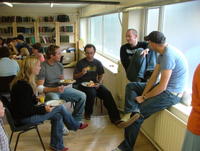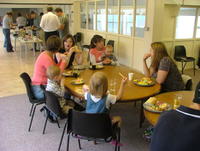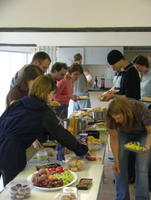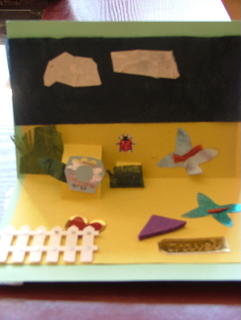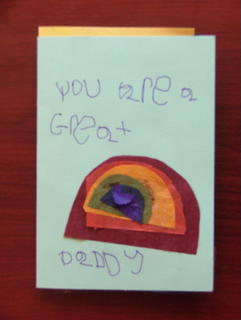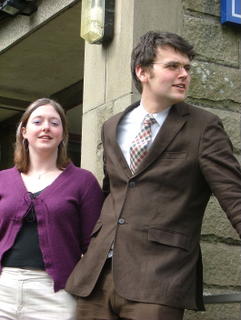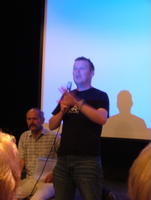
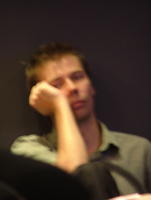
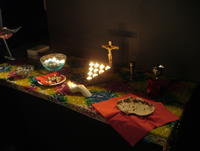
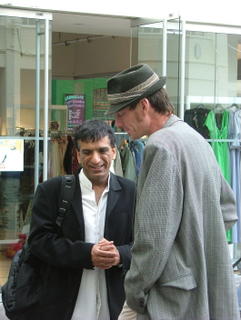
East meets West in this photo of Pall Singh and
Andrew Jones. But which represents which? Pall is a British (West, Britain being on the western edge of the Known World - with anything to our west, such as the Americas, being the New World) Indian (East). Andrew is a [tallskinny]kiwi (East, New Zealand being east of India, and about as far east as you can go before falling back into yesterday's West) of European (West) descent, who currently lives in the Orkneys (a parallel universe in the far North).
Pall is engaging in mission with what he refers to as the "
Goodness Gracious Me /
The Kumars at Number 42 Generation" - British Indians for whom your average white middle-class church is too western, but for whom most of the (excellent, in many ways) average Indian church here is too eastern - like going back to India to visit the grandparents. Like British-born Indians,
Sanctuary is a fusion of (at least) two cultures. Pall led us in worship, using Indian-inspired visual (film) meditations over which he led us in prayer; and inviting us to go up to a table, whenever we were ready to do so, to take Indian bread, and wine, to take an Indian sweet as we thought of and prayed for family, and to place a stone in a bowl of water as we prayed.
I was a little surprised that Pall's approach to resourcing Sikhs, Hindus and Muslims on a spiritual journey towards Jesus was troubling to some of those gathered, who felt that in order to genuinely follow Jesus people from these cultures needed to 'Christianise,' by which I mean take on European Christendom. To my mind, Sikhs, Hindus, Muslims, along with Europeans, are biblically all Gentiles, and if the early church determined that Gentile converts did not need to take on Jewish culture, why should eastern converts take on western culture? If European converts took pagan religious festivals and endued them with Christian meaning to create Christmas and Easter (not literal commemorations, but rich celebrations, of Jesus' birth and resurrection), then why should not the same be done with, say, Diwali, the Festival of Lights (God the Father being described in the Bible as the Father of Lights; Jesus, and his disciples, as the light of the world)?
Andrew Jones led two teaching sessions. The first, in which he spoke about the nature of kingdom growth and the principle of finding the Person of Peace and entering into/staying at their home, could have come straight out of
St Thomas' here in Sheffield. I like it when I come across the same teaching, from new or different angles, in multiple contexts: the evidence of two or more witnesses...
In the second session, Andrew threw out all sorts of interesting observations, weaving together biblical observations from the Wisdom Writings (Proverbs, Ecclesiastes) and contemporary cultural shifts - such as 'new' approaches to leadership and structure within a community (ants in Proverbs/emergence theory in business), 'new media' (that turns passive readers/viewers into inter-active writers/surfers) - to bring out several pointers for those seeking to engage in mission in our changing cultural context.
One of his thoughts I was most struck by was on operating according to a gift-economy (which is, after all, God's economy - grace). In the market-economy, when you give something to someone, you get financial renumeration (plus profit) in return. In the gift-economy, when you give a gift, you receive in return not renumeration but enhanced
reputation - and this in turn enables you to give away more gifts to more people. Andrew illustrated this from the internet: when you blog something people value, Google notes that they are visiting you, notes when they link from their site to yours, and your site moves up the Google ratings, where more people can discover it more quickly...Anyway, I value the gift-economy, and am challenged to live more and more according to this subversive economy of the kingdom. Cheers, tsk!
Photos: Eastern communion table;
Jonny Baker feels the effect of a hot, dark room; Bob Hopkins and Roger Ellis; Pall Singh and
Andrew Jones.



